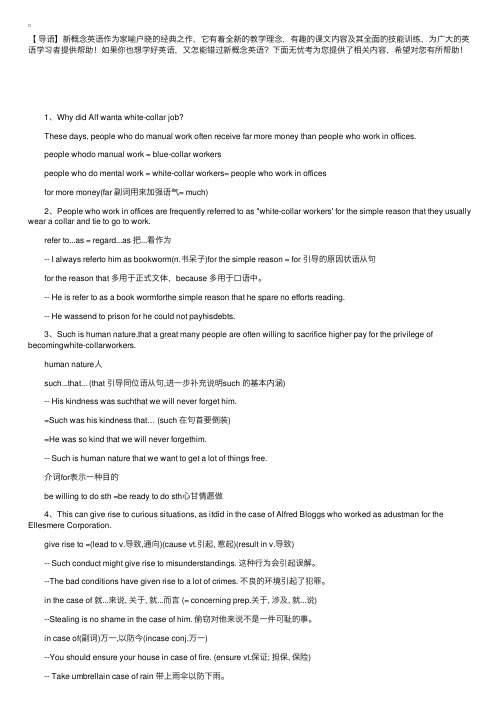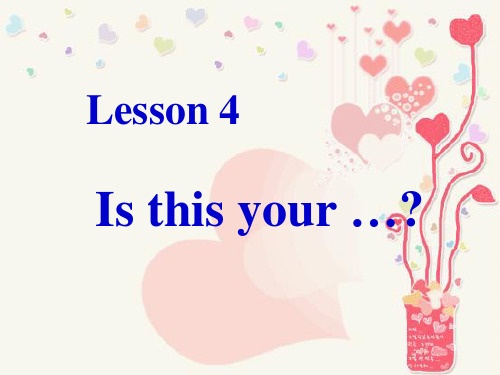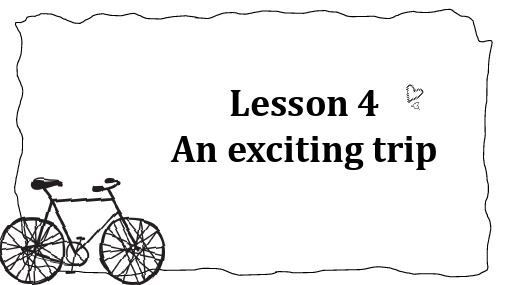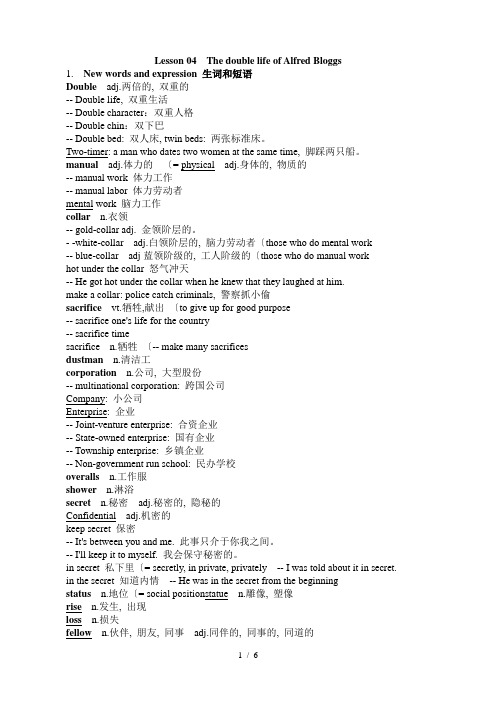Lesson 4
新概念英语第三册:Lesson4重点句型解析

【导语】新概念英语作为家喻户晓的经典之作,它有着全新的教学理念,有趣的课⽂内容及其全⾯的技能训练,为⼴⼤的英语学习者提供帮助!如果你也想学好英语,⼜怎能错过新概念英语?下⾯⽆忧考为您提供了相关内容,希望对您有所帮助! 1、Why did Alf wanta white-collar job? These days, people who do manual work often receive far more money than people who work in offices. people whodo manual work = blue-collar workers people who do mental work = white-collar workers= people who work in offices for more money(far 副词⽤来加强语⽓= much) 2、People who work in offices are frequently referred to as "white-collar workers' for the simple reason that they usually wear a collar and tie to go to work. refer to...as = regard...as 把...看作为 -- I always referto him as bookworm(n.书呆⼦)for the simple reason = for 引导的原因状语从句 for the reason that 多⽤于正式⽂体,because 多⽤于⼝语中。
-- He is refer to as a book wormforthe simple reason that he spare no efforts reading. -- He wassend to prison for he could not payhisdebts. 3、Such is human nature,that a great many people are often willing to sacrifice higher pay for the privilege of becomingwhite-collarworkers. human nature⼈ such...that... (that 引导同位语从句,进⼀步补充说明such 的基本内涵) -- His kindness was suchthat we will never forget him. =Such was his kindness that… (such 在句⾸要倒装) =He was so kind that we will never forgethim. -- Such is human nature that we want to get a lot of things free. 介词for表⽰⼀种⽬的 be willing to do sth =be ready to do sth⼼⽢情愿做 4、This can give rise to curious situations, as itdid in the case of Alfred Bloggs who worked as adustman for the Ellesmere Corporation. give rise to =(lead to v.导致,通向)(cause vt.引起, 惹起)(result in v.导致) -- Such conduct might give rise to misunderstandings. 这种⾏为会引起误解。
Lesson4(课件)新概念英语第一册

• Go there. 到那儿去。
• there 那里 • His coat is there. 他的外套在那里。
• over there 在那边 • My son is over there. 我的儿子在那边。 • where 哪里
• ticket 票 • a train ticket 一张火车票 • a movie ticket 一张电影票 • ticket office 售票处 • a bus ticket 公交车票
• umbrella [ʌm'brelə] n.伞;雨伞 • take an umbrella 带一把雨伞
• please 请 • Please open the window. 请打开窗户。 • Please be quiet. 请安静点。 • please 还有“ 求你了,拜托”的意思。
• here 这里 • Here you are, Tom. 给你,汤姆。 • I live here. 我住在这里。 • here and there 到处 • Come here. 到这儿来。
语法
• 某些祈使动词可以后跟and和另一个祈使动 词,而不是后跟带to的动词不定式结构。
• Come and see this goldfish. • Go and buy yourself a new pair of shoes. • 去给自己买双新鞋吧。 • Wait and see. 等着瞧吧。
New words and expressions:
• suit n. 一套衣服
• (1) 这是你的套装吗? • e.g. Is this your suit? • (2)女式套装 • woman’ s suit • (3)男式套装 • man’s suit • (4) v. 适合 • e.g. The suit suits me. • (5) a bathing suit
新概念英语第一册Lesson 4

C.ou C.lla C.ckt C.u C.vie C.ou C.iu C.oo C.cer C.oa
选择填空 ( A )1.My coat and umbrella ,please. A.my B.your C.I ( B )2.—A: Here is my ticket. —B: __________. A.Thank. B.Thank you. C.Thank very much. ( B )3.What’s this? . A.It’s is a watch B.It’s a watch C.Yes,it is ( A )4. a cloakroom? Yes it is. A.Is this B.This is C.It is. ( A )5.Are you ? A.Number five B.Five Number C.five number
Sorry . Thank you. Please . Pardon?
1. You do something wrong. What do you say ? 2. Someone gives you something. How do you thank him or her ? 3. You don’t hear something. What do you say ? 4. Which word do you use when you ask for something ?
Answer the questions with Yes or No like the example. Is this your book? Is this your car ?
1. Is this 2. Is this 3. Is this 4. Is this 5. Is this your your your your your coat ? watch? school ? ticket ? book ?
lesson4

Questions on the text
6.What did he do during the next six months? He spent as much time as possible reading. 7.What did he usually do after eleven o'clock every evening while working in a restaurant? He would sit out near the kitchen door and read the newspaper. 8.What was his main problem? There are too many new words which he didn’t know the meaning and the pronunciation. 9.Who offered to help him? And how did this man help him? An old Jewish man did. He explained the meaning of the words to Sidney and told him how to pronounce them.. Then he told him to read the sentences again and get their meaning in the context.
contribution n 贡献 He has made an important contribution to the company's success他对公司的成功作出了重要 的贡献。
• • • • • • • • • • •
Useful Expressions See sb doing sth 看见某人正在做某事 Stare at 盯着 Get off 从……下来,下车 Say to oneself 自言自语 Be able to do 能够做 Think about sth. 考虑某事 Spend….time(in)doing 花….时间做某事 Spend on 把…花在 别担心花多少钱用于旅行。 Don’t worry how much you spend on the trip.
新概念英语第一册Lesson4课件

新概念英语第一册Lesson4
1
of course 水壶 behind 茶壶 now 找到 boil
当然
kettle 在...后面 teapot 现在
find 沸腾,开
新概念英语第一册Lesson4
2
翻译
你会沏茶吗? Can you make the tea ? 水壶里面还有水吗? Is there any water in the kittle? 你能找得到吗? Can you find them ? 它在你前面. It's in front of you .
新概念英语第一册Lesson4
19
_____ _____ _______. Thank you ,Bob.
Bob ! Yes ? ____ _____ _____? I ____type this letter.
新概念英语第一册Lesson4
20
I can't read it ! The boss 's handwriting is ______.
新概念英语第一册Lesson4
Where is Pamela ? She is ___ ___ . She is ___ __ ____,sir.
新概念英语第一册Lesson4
18
Can she ___ this ___ for me ?Ask her please . Yes ,sir.
Can you type this letter for the _____please ,Pamela? Yes ,_____ _____ I can.
terrible['terəbl]
糟糕的
新概念英语第一册Lesson4
新概念英语第三册-Lesson4

业工作的人多得多。 • These days, people who work in the sports world/entertainment industry often receive far more money than people who toil in other sectors.
Exercise
• 森林被称作地球之肺,因为它们为地球上的生物 提供氧气。 • Forests are frequently referred to as ‘the lungs of the earth’ for the simple reason that they provided oxygen for all the creatures on the earth.
Text
体育界/娱乐界的人挣的钱比在其他行业的人多 护士比医生挣得钱要少得多
•.
明星比农民挣得多得多
A receive more money than B.
A do more sth than B.
Text
• These days, people who do manual work often
Exercise
A is the power of TV that it can make a person • ______ suddenly famous. (09 辽宁) • A. Such B. This D. That D. So
Exercise
• 年轻人追星乃人之常情。 • Such is human nature that young people are often willing to run after their idol.
新概念英语第二册 Lesson 4 课件

5. centre n. 中心,中央 (美语写作center) shopping centre 购物中心 in the centre of ...在...的中心
e.g. 在北京的中心 in the centre of Beijing
6. abroad adv. 在国外 be abroad 在国外 go abroad 去国外 live abroad 住在国外 (国外定居) travel abroad 在国外旅游 study abroad 国外学习
The doctor has saved over two hundred people’s lives so far. 到目前为止,这位医生已挽救了二百多人的生命。
用for 或since填空。
1. Jill has been in Ireland since Monday. 2. Jill has been in Ireland for three days.
否定句:主语+have/has not+过去分词+其它 He has not been to Australia.
疑问句:Have/Has+主语+过去分词+其它 Has he been to Australia?
三、现在完成时的时间状语
1. 现在完成时与不明确的过去时间状语副词before,just, already,yet,ever等连用。
• I have just received a letter from my brother, Tim. He is in Australia. He has been there for six months. Tim is an engineer. He is working for a big firm and he has already visited a great number of different places in Australia. He has just bought an Australian car and has gone to Alice springs, a small town in the centre of Australia. He will soon visit Darwin. From there, he will fly to Perth. My brother has never been abroad before, so he is fending this trip very exciting.
新概念英语第三册Lesson4

Lesson 04 The double life of Alfred Bloggs1.New words and expression 生词和短语Double adj.两倍的, 双重的-- Double life, 双重生活-- Double character:双重人格-- Double chin:双下巴-- Double bed: 双人床, twin beds: 两张标准床。
Two-timer: a man who dates two women at the same time, 脚踩两只船。
manual adj.体力的〔= physical adj.身体的, 物质的-- manual work 体力工作-- manual labor 体力劳动者mental work 脑力工作collar n.衣领-- gold-collar adj. 金领阶层的。
- -white-collar adj.白领阶层的, 脑力劳动者〔those who do mental work-- blue-collar adj蓝领阶级的, 工人阶级的〔those who do manual workhot under the collar 怒气冲天-- He got hot under the collar when he knew that they laughed at him.make a collar: police catch criminals, 警察抓小偷sacrifice vt.牺牲,献出〔to give up for good purpose-- sacrifice one's life for the country-- sacrifice timesacrifice n.牺牲〔-- make many sacrificesdustman n.清洁工corporation n.公司, 大型股份-- multinational corporation: 跨国公司Company: 小公司Enterprise: 企业-- Joint-venture enterprise: 合资企业-- State-owned enterprise: 国有企业-- Township enterprise: 乡镇企业-- Non-government run school: 民办学校overalls n.工作服shower n.淋浴secret n.秘密adj.秘密的, 隐秘的Confidential adj.机密的keep secret 保密-- It's between you and me. 此事只介于你我之间。
- 1、下载文档前请自行甄别文档内容的完整性,平台不提供额外的编辑、内容补充、找答案等附加服务。
- 2、"仅部分预览"的文档,不可在线预览部分如存在完整性等问题,可反馈申请退款(可完整预览的文档不适用该条件!)。
- 3、如文档侵犯您的权益,请联系客服反馈,我们会尽快为您处理(人工客服工作时间:9:00-18:30)。
趣味英语天天学Study Hard, Enjoy Fun Lesson 3 Do you speak English?I had an amusing experience last year. After I had left a small village in the south of France, I drove on to the next town. On the way, a young man waved to me. I stopped and he asked me for a lift. As soon as he got into the car, I said good morning to him in French and he replied in the same language. Apart from a few words, I do not know any French at all. Neither of us spoke during the journey. I had nearly reached the town, when the young man suddenly said, very slowly, “Do you speak English?”As I soon learnt, he was English himself!New words and expression 生词和短语Amusing (adj.) 好笑的,有趣的reply (v.) 回答Experience (n.) 经历language (n.) 语言Wave (v.) 招手journey (n.) 旅行Lift (n.) 搭便车notes on the text 课文注释1.I drove on to the next town.我继续驶往下一个城镇。
句中的副词on有“继续地”,“不停顿地”的意思。
2.On the way, 在途中3.Apart from, 除了……以外。
4.As soon I learnt, he was English himself. 我很快就知道,他自己就是英国人。
Special difficulties 难点Words often confused 经常容易混淆的词A.Ask and Ask forAsk (a question) 问(一个问题):After the lesson, he asked me a question.Ask for (something) 要求(某样东西):He asked for an apple.趣味英语天天学Study Hard, Enjoy FunB.Except, Except for, Apart from当except用在句首时,常用except for这个词组。
I invited everyone except Geroge. 除了乔治之外我邀请了每一个人。
Except for / Apart from this, everything is in order. 除此之外,其他都已就绪。
C.Which of, either of, neither of, both of, 这些短语用于两个人或两件事Which of the two do you want? 这两个你要哪一个?Either of them will do. 哪一个都行。
I like neither of them. 我哪一个也不喜欢。
I bought both of them.这两个我都买了。
Grammar语法Part I. 现在完成时现在完成时的形式为:have (has) +过去分词。
主要有两种用法:“已完成”用法和“未完成”用法。
已完成的动作对现在照成的影响;未完成的动作持续到现在的情况。
一、表示过去发生的动作对现在造成的影响(已完成用法)1.现在完成时的“已完成”用法表示说话的时候这个动作已经结束,只是对现在造成影响。
可以不用时间状语,也可以喝一些表示不定时间状语连用,如already, yet, lately, often, rarely, ever, now, just, today等。
例如:I have decided against seeing him again. 我已决定不再见他。
He has just come back. 他刚回来。
She has traveled over many countries. 她到过许多国家。
2.现在完成时的“已完成”用法通常与瞬间动作的动词连用,不能和表示一段时间的状语连用。
例如:他已回来三周了。
He has come back for three weeks. 错误表达He came back three weeks ago. 或He has been back for three weeks. 正确表达那位作家已经去世两年了。
The writer has died for two years. 错误表达The writer has been dead for two years.或趣味英语天天学Study Hard, Enjoy Fun The writer died two years ago. 正确表达二、表示动作的持续和重复(未完成用法)现在完成时的持续性用法(即未完成用法)指动作或状态从过去某时开始继续到现在,可能继续下去,也可能刚刚结束,通常要与某些表示一段时间的状语连用。
1. 现在完成时的“未完成”用法常和for, since连用。
例如:I have worked here since I graduated. 自毕业以来,我一直在这儿工作。
He has been here for more than a month. 他来这里已有一个多月了。
I have lived in the city for about twenty years.我在这个城市住了差不多有20年。
2. 在“until (till, up to) now, up to the present, so far, in (for, over, during) the past(last, recent) few (several, two…)months (days…)等结构中也常用现在完成时表示动作的持续。
例如:Up to now, I have finished two-thirds of the work.到现在为止,我已完成了这个工作的三分之二。
We have seen each other three times in the past three weeks.最近三周我们已见过三次面了。
So far she has written five books.到现在为止她已经写了五本书。
He perhaps has made some friends by now.到现在,他可能已经交了几个朋友。
3.持续性用法不适用于表示短暂动作或位置转移的动词,如:open, break, go,come, arrive, die, leave等。
例如:He _________ Beijing for five years.A. has come toB. has been inC. has arrivedD. has gone to答案为B。
三、现在完成时的特殊用法1. 现在完成时用在时间或条件状语从句中,表示将来某个动作发生之前已完成的动作。
例如:I’ll wait until he has written his letter. 我会等到他把信写完。
I’ll go and see the exhibition as soon as I have got the recorder fixed.我把录音机一修好,就去看展览。
I’ll give my opinion when I have read the book through.我把书看完了再提意见。
2. 在“this is (it is) the first (second,…) time that…”句型中,常用现在完成时。
趣味英语天天学Study Hard, Enjoy Fun但是,在“it was the second (…) time that…”句型中,用过去完成时。
例如:This is the second time that I have seen the film.这是我第二次看这部电影。
That was the third time that I had visited the place.那是我第三次参观那地方。
4.在“it is (has been)…since”结构中,主句常用现在完成时,也可用一般时。
但是在since后面要用过去时。
例如:It is (has been) about 7 years since I came here.我来这儿近7年了。
It is (has been) a long time since I last came to the town.自从我上次到城里来,已有很长时间了。
5.Have been to 和have gone to的用法比较。
Have been to的意思是“到过某地”,说话时此人很可能不在那里,已经回来,侧重指经历;而have gone to的意思是“已经去了那里”,说话时此人已不在这里,很可能已到达那里,也可能在路上。
例如:He has been to Beijing. 他去过北京。
He has gone to Beijing. 他到北京去了。
6.在where 或when引起的疑问句中,一般不用现在完成时,因为询问者关心的是过去发生的事或事情发生的具体时间。
例如:When did you buy the jacket? 你什么时候买的衣服?I bought it last Sunday. 我上星期天买的。
When did you finish your homework? 你什么时候做完你的家庭作业。
Part II. 过去完成时一、过去完成时的一般用法过去完成时主要表示过去某时或某动作之前已完成的动作或情况,即表示“过去的过去”。
通常可分为“已完成”用法和“未完成”用法。
1.“已完成”用法表示一个动作或状态在过去某一时间或动作之前刚刚完成或结束,也可能是早已完成或结束。
例如:I had just got home when it rained. 我刚回到家,天就下起雨来。
The plane had already taken off when we arrived at the airport.我们到达机场的时候,飞机已经起飞了。
